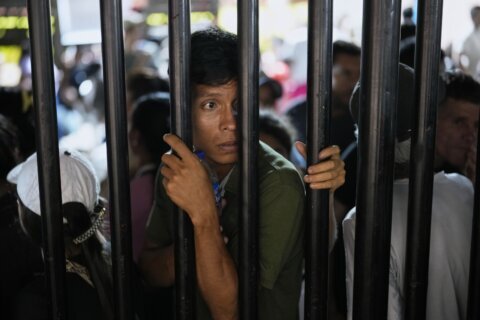TEL AVIV, Israel (AP) — Some families of hostages held in Gaza believe the latest round of cease-fire talks between Israel and Hamas could be the last best chance to set their loved ones free after more than 300 days of captivity.
The families have advocated tirelessly to secure the release of their relatives, who were snatched on Oct. 7 during Hamas’ cross-border attack that started the war.
Their hope that the latest talks could result in a breakthrough is tinged by 10 months of disappointment — and the growing fear of a wider Mideast war as Israel faces rising tensions with Iran and Hezbollah, the Iran-backed militant group based in Lebanon.
Roughly 110 hostages remain in Gaza after about 100 were freed during a brief cease-fire in late November. More than 40,000 Palestinians have died in the war, according to Gaza health officials, who do not distinguish between civilians and militants.
Throughout the war, the families of hostages have pushed on with anguish and despair, rallying Israelis to their cause, lobbying local and foreign lawmakers, pleading that someone put an end to their nightmare.
They’ve watched as multiple rounds of negotiations have crumbled. And they’ve increasingly directed their ire at Prime Minister Benjamin Netanyahu, who they accuse of prioritizing his political survival over the fate of their loved ones.
“We need a cease-fire to get them all back,” said Zahiro Shahar Mor, a nephew of Avraham Munder, 78, who was kidnapped from Kibbutz Nir Oz along with his wife, his daughter and grandson — the latter three having returned during the first and only truce deal. “Had Netanyahu wanted them here, they would have been here.”
Netanyahu insists he keeps the plight of the hostages top of mind.
“The pain these families have endured is beyond words,” Netanyahu told a joint session of the U.S. Congress last month. “I will not rest until all their loved ones are home.”
He says the best way to free them is to keep up military pressure on Hamas, a position backed by two far-right governing partners who are critical to maintaining his grip on power. They have pledged to topple the government should Netanyahu proceed with a deal that would release hostages in exchange for freeing Palestinian prisoners convicted of serious crimes or an end to the war.
Netanyahu has also enraged some of the hostage families throughout the war with comments or actions that appeared to suggest he does not sympathize with their ordeal.
He has only recently suggested remorse for his role in the policy and security failures that led to Hamas’ unprecedented attack, which led to the killing of some 1,200 Israelis. He has been accused of avoiding the families of hostages, especially those whose relatives are known to have died in captivity. In comments leaked to Israeli media, he reportedly said Hamas was under more pressure than Israel to move toward a deal because the hostages were “suffering but not dying.”
In fact, more than a third of the 110 hostages still held are said to have died in captivity or on Oct. 7, their bodies taken to Gaza. Three hostages were mistakenly killed by the Israeli military. Seven hostages were freed in rescue missions, as were several bodies.
The hostage families have watched as their weekly protest in central Tel Aviv has gradually dwindled in size, with Israelis growing weary of the seemingly endless struggle. They have watched the conflict broaden, nearly tipping over into a wider regional war that could eclipse their own plight.
Still, the families have kept up their fight and in July nearly two dozen met with Netanyahu in Washington during his visit there.
Gil Dickmann, whose cousin Carmel Gat is being held in Gaza, said Netanyahu did not make any tangible promise but he left the meeting feeling optimistic that progress could come soon. Instead, weeks have passed with no movement.
“That is an eternity for the hostages,” said Dickmann, who was among a group of hostage relatives who wore a yellow shirt that read “seal the deal now” in Congress during Netanyahu’s speech. “Anything could happen to them during that eternity.”
Dickmann said that attempts by both sides to squeeze as much out of the deal were only making it more elusive.
The families of the eight American-Israeli hostages held an hourlong meeting with both Netanyahu and President Joe Biden, but the Israeli leader did not make any firm promises on a deal to them either, said Ruby Chen, the father of Itay Chen, who was killed Oct. 7, his body taken into Gaza.
Chen said he has drawn optimism surrounding this latest round of talks from his weekly briefings with U.S. officials, who he said view the cease-fire deal as a chance to bring stability to the wider region, after the killings of two militant commanders in Beirut and Tehran sparked fears of a wider war. He urged the U.S. to publicly call out whoever it saw as obstructing the talks, although he declined to point any finger himself.
“The prime minister needs to look hard in the mirror and understand that these are the days that the history book of the state of Israel is being written,” he said. “He needs to decide where he wants to be in that history book.”
Other hostage relatives have had harsher words for the Israeli leader.
“Netanyahu, we know you don’t want a deal. We know that if it was up to you, the hostages would rot and die in captivity,” Yotam Cohen, whose brother Nimrod, 19, is being held captive, said at a protest Thursday ahead of the new round of talks. One protester chanted “their blood is on your hands”.
___
Associated Press writer Ami Bentov contributed to this report.
Copyright © 2025 The Associated Press. All rights reserved. This material may not be published, broadcast, written or redistributed.








